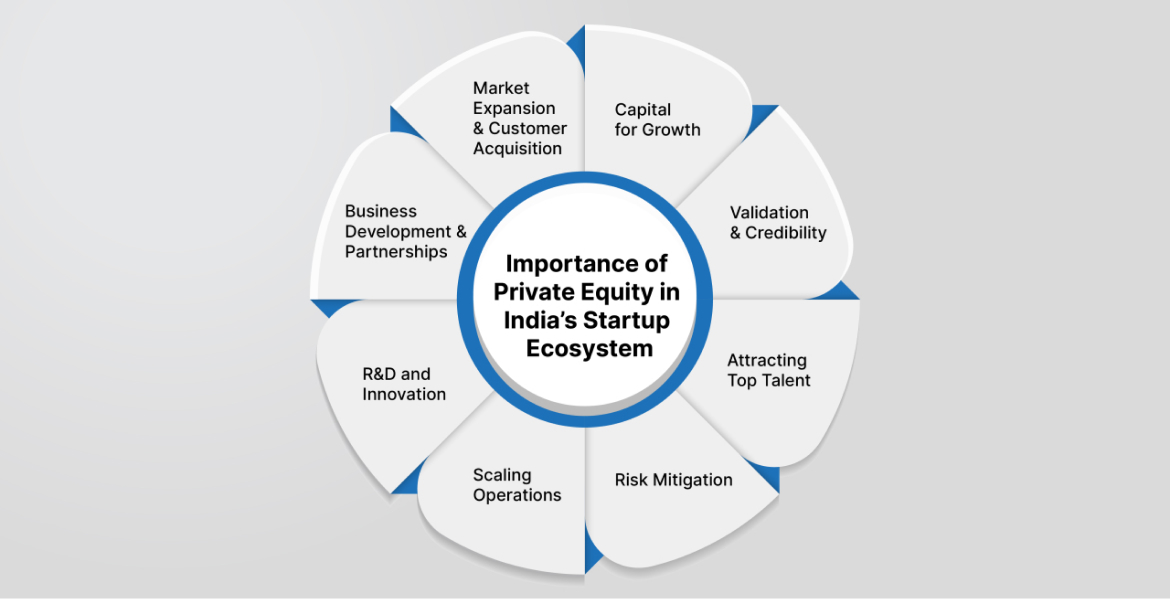Introduction
The Indian startup ecosystem has gained global innovation hub status, but scaling is an enormous challenge to most early-stage enterprises. As traditional sources of funds remain limited in their strategic capabilities, private equity firms in India are filling the gaps as strategic growth enablers. These companies not only bring large amounts of capital but also offer operating skills and access to markets. Consequently, private equity firms in India are transforming the way startups develop, grow, and build long-term value in a highly competitive environment.
The Strategic Importance of Private Equity in India’s Startup Ecosystem
The transformative aspect of private equity (PE) in the Indian startup ecosystem fills the gap between the initial funding and long-term scalability. Unlike venture capital, which typically funds startups at the initial stage, private equity firms in India invest in companies with established business models that require strategic funding to accelerate growth. This investment format aligns well with the emerging entrepreneurial ecosystem in India, where startups are proliferating and require additional capital, operational mentorship, and robust governance structures.
-
Targeted Capital for Sector-Specific Growth: Indian private equity firms are also paying closer attention to high-potential sectors, such as fintech, health tech, clean energy, and B2B SaaS, enabling startups to expand into new markets and verticals. They possess sectoral expertise, which allows them to finance projects within their structure in a manner that accelerates commercial viability and payback.
-
Deeper Market Penetration Strategies: Indian PE firms can facilitate this through their strong strategic planning and growth roadmaps, which enable startups to access underserved geographies, establish infrastructure, and acquire users more efficiently.
-
Institutionalization of Business Models: Private equity participation brings in disciplined finance and board management, making startups ready to face IPOs or major M&A, and long-term sustainable strategies are strengthened.
Capital Injection and Beyond: What Startups Gain from Private Equity Funding
Private equity financing is a crucial growth booster for Indian startups, as it not only injects funds into the business but also transforms their strategic direction. Although funding serves the short-term purpose of bridging the financial divide in expanding operations, the work of private equity firms in India extends much beyond writing checks as they work in close partnership with startups to reinforce internal strengths and market presence.

-
Strategic and Operational Guidance: In addition to capital support, Indian PE firms also provide guidance in refining business models, navigating regulations, and developing scalable infrastructure. This includes assistance with establishing key performance indicators (KPIs), developing investor-ready reporting systems, and enhancing cross-functional alignment to drive operational efficiency and effectiveness.
-
Access to Global Networks and Market Expansion: These firms in India can help connect the dots globally with their networks of investors and offices across the world, enabling cross-border growth prospects, strategic alliances, and supply chain evacuation, which are crucial when a startup seeks to expand to new territories or wants to expand internationally.
-
Governance and Leadership Development: PE firms in India also assist in creating formal governance structures and guide the hiring of experienced executives to fill C-suite positions, thereby bolstering capacity, compliance, and sustainability.
Value Creation Playbook: Private Equity Firms as Growth Architects
Indian private equity firms do much more than provide financial support; they are strategic co-partners in the scaling of businesses. They usually get involved once the startups have already gained some initial traction and then help them go through the complicated period of operational and financial restructuring required to become a market leader. These companies introduce disciplined methods that help startups transform into professionally managed, growth-focused companies.
-
Talent Acquisition and Leadership Enhancement: These PE firms also assist startups in hiring seasoned C-suite executives, board advisors, and functional heads who add maturity to the decision-making process at an early stage. Such infusion of leadership facilitates the transition from founder-dominated operations to institutionally controlled businesses.
-
Financial Restructuring and Capital Efficiency: Indian private equity players possess robust financial systems, effective capital allocation, and cost discipline. It means that each funding round will be spent on tangible results, which enhances the productivity of capital and valuation.
-
Operational Optimization and Process Engineering: Private equity firms have been helping startups to develop scalable infrastructure, utilize analytics to make real-time decisions, and deploy tech-enabled workflows to enhance agility and efficiency in departments.
-
Strategic Road mapping and Market Expansion: They also collaborate with founders in creating long-term strategic road maps, exploring new opportunities in different markets, and instituting geometric or segment-wise growth, often resulting in hyperbolic growth curves.
Sectoral Focus: Where Private Equity is Making the Most Impact
The role of private equity firms in India is becoming increasingly transformative across high-growth sectors and innovation-driven industries. With India's economic environment becoming increasingly diversified and technology-driven, a focused approach to private equity is facilitating scale, sustainability, and long-term profitability in emerging fields.
The following are the most influential areas in which the private equity firms in India are actively directing the capital and skills:
-
Healthcare & Life Sciences: The 2024 private equity investment was down to US$ 1.55 billion, the lowest in the last couple of years, representing a 30% decrease year-over-year. Nonetheless, non-core businesses, such as diagnostics and medical devices, still receive some attention.
-
Real Estate & Infrastructure: In 2024, investments increased by 32 percent to a high of US$ 4.2 billion, with warehousing and logistics being the dominant growth area. Real estate increased privately by 10 percent year-over-year to US$ 4.3 billion, with industrial and logistics assets leading the way.
-
Financial Services & IT: Buyouts increased by 39% to US$ 16.8 billion in 2024, the second-highest on record, with the financial services cluster accounting for US$ 9 billion, up 41% compared to the same time last year. IT and financial services are expected to be prime targets for mergers and acquisitions in 2025.
-
Market Performance: Private Equity Deal Flow:. In 2024, a total of US$ 29 billion of PE deal flow emanated from private equity, as part of a total PE-VC investment of US$ 43 billion across all PE sectors, representing a 9% improvement compared to 2023.
Building Governance and Long-Term Value
Indian private equity firms play a significant role in instilling good governance habits into the startups, making them not only high-growth enterprises but also well-grounded and prepared for the future. Their participation helps transform founder-dominated structures into institutionally controlled businesses with long-term vision and responsibility.
-
Corporate Governance Frameworks: Formal governance mechanisms, such as the establishment of advisory boards, independent board members, and performance-oriented management models accompanied by transparency, compliance, and strategic direction, are some of the standard features introduced by private equity firms in India.
-
Vision Alignment and Growth Discipline: These companies work closely with founders to strike a balance between short-term objectives and long-term plans. They promote scalable business operations, sustainable unit economics, and the culture of data-driven strategic decision-making.
-
ESG and Compliance Standards: PE firms in India are increasingly adopting environmental, social, and governance (ESG) frameworks to meet global standards and access institutional capital, which enhances the market credibility of a startup and its ability to withstand crises in the long term.
Conclusion
In India, private equity firms are fueling scalable entrepreneurship by providing structured capital, operational expertise, and long-term strategic guidance. By enhancing good governance, sectoral concentration, and value-based exits, these firms are promoting sustainable innovations in the emerging sectors. The collaboration of entrepreneurial nimbleness and private equity discipline will continue to redefine the developmental path of promising businesses in India as the startup ecosystem evolves.







